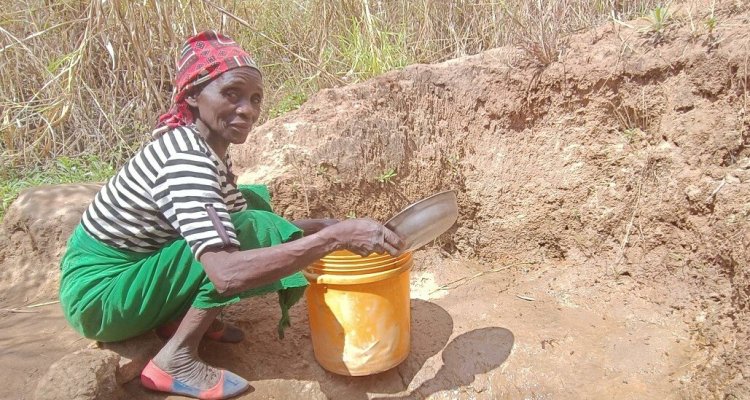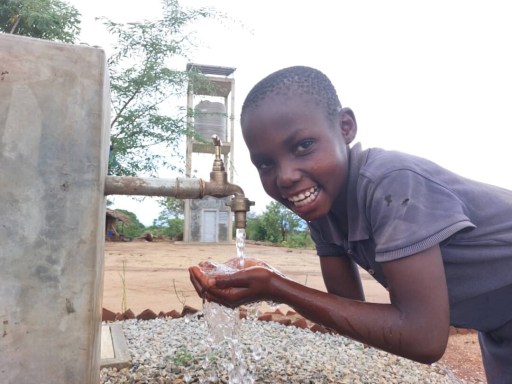
Mangochi is popular for its beaches along Lake Malawi but in many villages in the district, access to safe and clean water remains a major challenge. This means long walks to open and contaminated water sources, waterborne diseases and limited agricultural and economic development.
In the areas where water sources are kilometres away, women wake up early in the morning and walk for hours to collect water.

This used to be the situation for Mtisunge Tebulo and other villagers at Chimwaza Village in Traditional Authority Mtonda in the district.
“To collect enough water, I used to travel up to six times a day and if I started in the morning, I would only finish my journey at around noon,” she said in an interview at her home.
According to Tebulo, this was a huge challenge for her as she could not find the time to go to the field to take care of her crops or to do other housework.
She added that in many cases, the water they were drawing was contaminated and made her family sick.
Another resident of Chimwaza Village, Rajafayise who is aged over 50, said she experienced severe pain in her legs whenever she walked for a long distance to search for water and, despite the pain, she had to go to the well several times a day in order to have enough water for her household.
“Dogs also used to drink from the same water source where we were drawing our drinking water,” she explained.
According to Chimwaza Water Users Committee member, Moses Komwa, young people deserted the area due to lack of water as they could not see any viable economic activity which they could carry out.
At Mpopo area in the district, residents also shared similar stories of difficulties in finding water.
Today, the early morning trips for water are now a distant memory for the residents as they have access to safe and clean water, thanks to Innovation: Africa.
Innovation: Africa (iA), is a non-profit organization which brings Israeli solar, water and agricultural technologies to rural communities across 10 African countries, including Malawi. Since 2008, iA has completed over 880 installations, providing light to schools and medical centers and crucially pumping safe and clean water. It is impacted over 4 million people across Africa, 740,000 of which are in Malawi.

In Malawi, iA has provided light and clean water to over 150 communities, including the areas of Traditional Authorities Bwananyambi, Katuli, Chilipa, Mponda, Chimwala, Ntonda, Nankumba, Chowe and Jalasi in Mangochi.
Innovation: Africa installs solar water pumping systems to pump water from the aquifers beneath the ground. According to iA’s Country Manager, Keith Chisalayi, for any water project, the organisation targets villages with between 1,500 to 3,000 residents and takes roughly 4-6 months to complete The process involves, the surveying and drilling of the borehole.
The organisation usually drills up to 70-80metres into the ground in order to find water. A submersible solar pump is then installed and it pumps the water up from the the aquifer. This water is tested to ensure to is safe and fit for human consumption. The water is pumped into a tank that can hold 10,000 litres of water and sits at the top of a tower that is as high as 10 metres. The tower is built on the highest point in a particular village so that the water should be distributed using gravity.
From the tank, water passes through a network of underground pipes to water taps installed all over the village.
During construction, the local contractor hires, pays and trains 10 community members to participate in the process. Upon completion, the trainees receive a certificate which helps with future employment opportunities. Moreover, this process ensures the long-term sustainability of the water project as in each village, at least 10 community members will know how to protect and maintain the system.
The community is encouraged to open a bank account and each member contributes around K300 per family . The funds are kept by the water committee and can be used to maintain the taps whenever a fault develops.
“For us to travel from our office to go to a village to replace a tap, is unsustainable. But with the communities being able to save money and replace the taps on their own, it empowers them and ensures that the projects are sustainable,” said Chisalayi.
He added that iA uses durable materials for their projects and some of the materials are shipped from Israel.
“Everything is being built to last for dedaces!” he said.

He further said that the organisation has remote monitoring technology which enables the real-time tracking of the system and how muchwater is being pumped. The information is sent to a server in Israel so iA engineers are able to remotely monitor the system on a daily basis. Should a malfunction occur, an alert is issued and the local engineers will be able to rectify it.
Just as it digs deep to find water, iA also digs deep to fundraise and finance the water projects as a single water project can cost US$65,000 (about K67 million).
Chisalayi said: “We are spending US$10,000 (about K12 million) just to drill a borehole because the drilling procedure is different from a handpump. We are targeting a minimum yield of 1 litre per second. The water quality also needs to be good. We are building concrete structures in villages and we hire a contractor and a third-party consultant who assist with supervision. All these add up but we want to ensure the highest possible standard of operations.”
From just having water clean enough to drink and close to their homes, to using the water for economic activities, hundreds of thousands of people in Mangochi have benefited from the water taps installed by iA.

At Chimwaza Village, vegetable gardens have now sprouted up at many homes, giving owners access to food which they eat.
“I sell some of the vegetables and this way I find money to buy salt,’ said Rajafayise who lives with her six children.

Men in the village are also making bricks, an economic activity which would not have been possible without the water.
Komwa, the water users committee member, said they are now building houses and have made 50,000 bricks to build a permanent structure for a community-based childcare centre that assists 60 children.
“We are very happy and we thank Innovation: Africa for this water project which is assisting the whole community, night and day,” said Komwa.
In Malawi, iA has completed 69 water projects as well as 81 solar projects – in which the organisation install solar power at institutions such as schools and medical centers.

Some of the areas Innovation: Africa is looking to expand its operations to are Zomba rural, Mulanje, Chiradzulu and Machinga.
“We focus on one region at a time because our projects require constant supervision during implementation.”said Chisalayi.
According to Chisalayi, iA has aims to implement projects in 200 additional villages in the country between 2022 and 2026 and we are certainly grateful for their endeavors to help support and uplift rural Malawian communities.
Follow us on Twitter:














